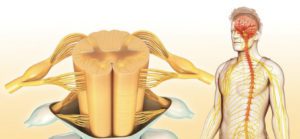 Lumbar radiculopathy refers to disease involving the lumbar (low back) spinal nerve root. This may also occur at other levels of the spine, including the cervical (neck) or thoracic (rib cage) regions. Lumbar radiculopathy is typically caused by a compression of the spinal nerve root. Symptoms may present in the legs, feet, or buttock, rather than in the lumbar spine (low back), which is called “referred pain.” This may manifest as pain, numbness, tingling (“pins and needles”), burning, cramping, or weakness in the limbs, or feet. If nerve root compression occurs at the level of the cervical spine, symptoms may be experienced in the arms or hands. Symptoms may range from mild to severe. Occasionally, bowel or bladder changes may occur. “Sciatica” is the term often used to describe these symptoms in the legs, but in fact the sciatic nerve is a specific region of the nerves as they leave your back.
Lumbar radiculopathy refers to disease involving the lumbar (low back) spinal nerve root. This may also occur at other levels of the spine, including the cervical (neck) or thoracic (rib cage) regions. Lumbar radiculopathy is typically caused by a compression of the spinal nerve root. Symptoms may present in the legs, feet, or buttock, rather than in the lumbar spine (low back), which is called “referred pain.” This may manifest as pain, numbness, tingling (“pins and needles”), burning, cramping, or weakness in the limbs, or feet. If nerve root compression occurs at the level of the cervical spine, symptoms may be experienced in the arms or hands. Symptoms may range from mild to severe. Occasionally, bowel or bladder changes may occur. “Sciatica” is the term often used to describe these symptoms in the legs, but in fact the sciatic nerve is a specific region of the nerves as they leave your back.
Radiculopathy Causes
Radiculopathy may occur when the spinal nerve roots are irritated or compressed by one of many conditions, including a disc herniation, spinal stenosis (narrowing), osteophyte {bone spur) formation, spondylolisthesis (vertebral slippage), foraminal stenosis, or other degenerative disorders.
Radiculopathy Diagnoses
Your doctor will consider your medical history and symptoms and give you a physical examination, during which the doctor may look for limitations of movement in the spine, problems with balance or walking, as well as any loss of extremity reflexes, muscle weakness, sensory loss, or abnormal reflexes that may suggest spinal cord involvement. Typically imaging tests are used to further evaluate radiculopathy if symptoms do not resolve with initial treatments. Sometimes, testing of the function of the nerves and muscles with an electromyography/nerve conduction study (EMG/NCS) is recommended. This two-part study, typically done together, may be very useful in the diagnosis of the cause of weakness and/or sensory changes. It may help determine if a nerve is damaged or trapped somewhere along its path, which may occur at the level of the spine or further down. If for instance, neuropathy or carpal tunnel syndrome is found, this may help direct your care for further work-up or intervention. It may be found that the nerve may be irritated or entrapped at more than one location at a time, which may explain why your recovery and treatment is not going as anticipated. Additionally, orthopedic issues such as arthritis or tendinitis, may overlap with radiculopathy and require additional workup or treatment. In these instances, multifaceted care may be required to address and monitor the separate ongoing issues and coordinate care between different treating specialists.
Non-Surgical Treatment of Radiculopathy
After consideration for your condition and medical history, treatment options for radiculopathy may include, but not limited to:
• Physical therapy and/or exercises that are designed to stabilize and strengthen the spine and promote a more open space for spinal nerve roots.
• Medications, such as steroids or non-steroidal anti-inflammatory drugs (NSAIDs) to reduce pain and swelling.
• Epidural steroid injections and nerve root injections help reduce swelling and treat acute pain that radiates into the arms or legs. These injections may also be used as a diagnostic tool to help confirm where the nerve root irritation is occurring and that this is in fact the cause of your symptoms.
Surgical Treatment of Radiculopathy
After consideration for your condition and medical history, early surgical evaluation and/or intervention may be recommended. Otherwise conservative, non-surgical treatment is typically advised. If these options are no longer adequately managing your symptoms, surgical treatment may be considered and will vary depending on what is causing the radiculopathy. Typically, these treatments involve some way of either decompressing the nerve or stabilizing the spine. If a nerve is being pinched somewhere else along its path, such as the median nerve at the carpal tunnel in the wrist, or a nerve in the leg, surgery to release the nerve may be required if symptoms are not controlled with non-surgical management.
Jaclyn Gorovoy Holt, D.O.
Physical Medicine and Rehabilitation
Jaclyn Holt, D.O. is a Board Certified Physical Medicine and Rehabilitation physician who specializes in non-surgical care. She works closely with other specialists to diagnosis, treat, and direct care of radiculopathy and other nerve entrapments and related conditions, including performance of electrodiagnostic testing (EMG/NCS). Please let us know how Dr. Holt and our multispecialty team at Orthopedic Center of Florida can help keep you active.
To schedule your appointment, please call 239-482-2663.
Orthopedic Center of Florida
Working Hard lo keep you active
239-482-2663 | www.ocfla.net
12670 Creekside Lane, Fort Myers, Fl 33919







